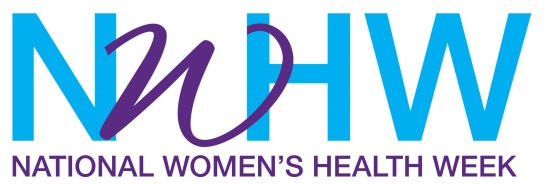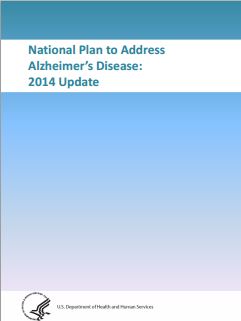| Encourage Cognitive Health and Wellness during National Women’s Health Week
 This week is National Women’s Health Week, an opportunity to empower women to make their health a priority. With women comprising the majority of those living with Alzheimer’s disease as well as Alzheimer’s caregivers, National Women’s Health Week offers a great chance to promote cognitive health and wellness among those who may need it most. This week is National Women’s Health Week, an opportunity to empower women to make their health a priority. With women comprising the majority of those living with Alzheimer’s disease as well as Alzheimer’s caregivers, National Women’s Health Week offers a great chance to promote cognitive health and wellness among those who may need it most.
Almost two-thirds of Americans living with Alzheimer’s disease – or 3.2 million people – are women. Women in their 60s are about twice as likely to develop Alzheimer’s disease over the rest of their lives as they are to develop breast cancer. And, women comprise over 60 percent of the unpaid caregivers for those with Alzheimer’s disease. In 2013, Alzheimer’s and dementia caregivers had $9.3 billion in additional health care costs due to the toll of caregiving on their own health.
During National Women’s Health Week, public health officials can:
- Promote early detection by encouraging older women to talk with their health care providers if they are experiencing memory issues or other early signs and symptoms of Alzheimer’s;
- Educate health care providers about the unique needs of Alzheimer’s and dementia caregivers, and connect female caregivers to services and supports that may help to alleviate the burden of caregiving for someone with Alzheimer’s; and
- Encourage women to participate in clinical trials and studies, which are always looking for healthy volunteers and caregivers, in addition to people with Alzheimer’s or dementia.
For more information on National Women’s Health Week, including finding an event near you, visit womenshealth.gov/nwhw.
National Association of Chronic Disease Directors Awards Six Road Map Grants
 Five states – Arizona, Hawaii, Illinois, Minnesota, and Wisconsin – as well as Puerto Rico were recently awarded grants from the National Association of Chronic Disease Directors (NACDD) to implement the Public Health Road Map. The state and territorial health departments will be partnering with various community-based organizations to undertake a variety of activities related to specific Road Map action items, including: Five states – Arizona, Hawaii, Illinois, Minnesota, and Wisconsin – as well as Puerto Rico were recently awarded grants from the National Association of Chronic Disease Directors (NACDD) to implement the Public Health Road Map. The state and territorial health departments will be partnering with various community-based organizations to undertake a variety of activities related to specific Road Map action items, including:
- In Arizona, increasing awareness of cognitive health in underserved populations
- In Hawaii, which has just recently developed its own State Plan on Alzheimer’s Disease, implementing those elements of the state plan that coincide with the Road Map, such as integrating cognitive impairment into multiple state strategic plans and developing public awareness materials designed to reduce the stigma of dementia
- In Illinois, developing state and local burden briefs addressing cognitive impairment and the needs of caregivers as well as assessing workforce competencies
- In Minnesota, addressing the care of older adults with dementia through the lens of co-occurring chronic conditions
- In Puerto Rico, designing a training module to educate public health professionals about the signs and symptoms of cognitive impairment
- In Wisconsin, gathering lessons learned from local projects to create dementia-friendly communities and promoting these models
If you are interested in finding out more information on a specific Road Map action item or in discussing ways to implement an action item in your state or local community, please contact Alison Sinton at asinton@alz.org.
2014 Update to National Alzheimer’s Plan Released
 On April 29, the U.S. Department of Health and Human Services released the 2014 annual update to the National Plan to Address Alzheimer’s Disease. The plan continues to include action steps for the Centers for Disease Control and Prevention (CDC) to help strengthen state public health workforces in understanding Alzheimer’s disease; engage the public health workforce on brain health, particularly through implementation of the Road Map; and to summarize and disseminate data on cognitive decline collected by state Behavioral Risk Factor Surveillance System (BRFSS) surveys. On April 29, the U.S. Department of Health and Human Services released the 2014 annual update to the National Plan to Address Alzheimer’s Disease. The plan continues to include action steps for the Centers for Disease Control and Prevention (CDC) to help strengthen state public health workforces in understanding Alzheimer’s disease; engage the public health workforce on brain health, particularly through implementation of the Road Map; and to summarize and disseminate data on cognitive decline collected by state Behavioral Risk Factor Surveillance System (BRFSS) surveys.
For more information on the National Alzheimer’s Plan, visit the Plan’s official website.
ASTHO Healthy Aging Webinar on Program & Policy Considerations for Supporting Caregivers: May 27, 2-3pm

In the latest in a series of webinars related to the Public Health Road Map on cognitive health and Alzheimer’s disease, the Association of State and Territorial Health Officials (ASTHO) will be hosting a Healthy Aging Webinar on Program & Policy Considerations for Supporting Caregivers on May 27 from 2:00-3:00 pm ET. This webinar will highlight three state- and community-based caregiving intervention case studies, revealing how cross-sector collaboration can positively affect caregiver health. It will feature best practices and lessons learned that should be considered when identifying and structuring caregiver interventions among various populations.
Speakers include Debra L. Cherry and Susan Howland from the Alzheimer's Association California Southland Chapter; Christine Merchant, Dementia Care Manager at the Office of Aging and Disability Services in the Maine Department of Health and Human Services; and Gayle Alston, Director of the training center at the Rosalynn Carter Institute.
Pre-registration is required. Visit https://cc.readytalk.com/cc/s/registrations/new?cid=ic59xebabd70 to sign up for this informative session.
The Alzheimer’s Public Health E-News is supported by Cooperative Agreement #5U58DP002945-04 from the Centers for Disease Control and Prevention (CDC). Its contents are solely the responsibility of the Alzheimer’s Association and do not necessarily represent the official views of the CDC.
|